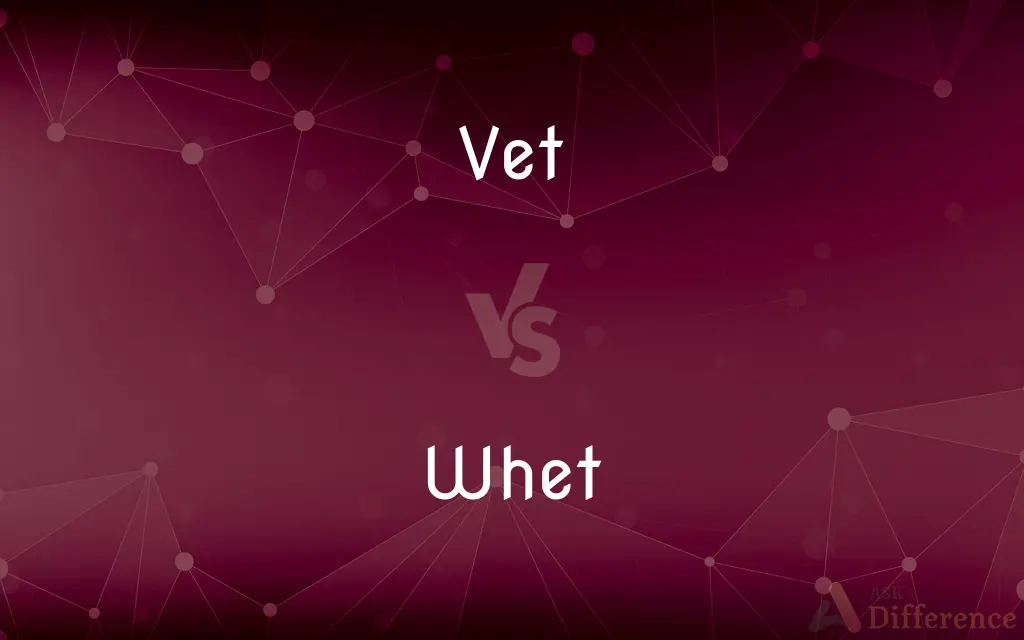Vet vs. Whet — What's the Difference?
Edited by Tayyaba Rehman — By Urooj Arif — Updated on March 28, 2024
Vet involves evaluating or examining something thoroughly, while whet means to sharpen or stimulate, as in a knife or appetite.

Difference Between Vet and Whet
Table of Contents
ADVERTISEMENT
Key Differences
Vet originally referred to the process of examining animals by a veterinarian but has expanded to mean any thorough examination or evaluation, such as vetting a candidate for a job. It implies a careful and detailed check to ensure suitability or credibility. Whet, on the other hand, derives from sharpening tools or blades and extends metaphorically to increasing one's desire, interest, or appetite for something. E.g., whetting your appetite with a starter.
While vetting often involves checking credentials, histories, or qualities to confirm authenticity or suitability, whetting is about honing or enhancing. For example, you vet a person's background before hiring, whereas you might whet your skills by practicing or taking new courses.
Vet can be used in both professional and casual contexts, signifying the act of making sure something or someone meets certain standards or criteria. Whet, however, is more specific in its use, typically relating to sharpening or stimulating an interest, appetite, or ability.
The outcomes of vetting are usually decisions based on suitability, such as approving a project or hiring a person. The outcome of whetting is an enhancement or intensification, such as a sharpened knife or increased anticipation.
Vetting requires access to information, resources for investigation, and a criterion for evaluation. Whetting, however, needs an object or subject to be honed and a method or action that leads to its intensification or improvement.
ADVERTISEMENT
Comparison Chart
Definition
To examine thoroughly.
To sharpen or stimulate.
Origin
From veterinary practices.
From sharpening tools or blades.
Context
Professional, administrative.
Personal skills, desires.
Outcome
Decision on suitability.
Enhancement or intensification.
Requirements
Information, criteria.
Object or subject, method.
Compare with Definitions
Vet
To examine thoroughly before approval.
The committee vetted the proposal carefully.
Whet
To stimulate appetite or desire.
The preview whetted my interest in the movie.
Vet
To evaluate the quality or accuracy of.
Editors vet the articles for factual errors.
Whet
To sharpen the edge of a tool or weapon.
He whetted the knife before carving.
Vet
To check the background of.
Employers vet potential employees.
Whet
To increase keenness or eagerness.
Training sessions whetted her skills in negotiation.
Vet
To inspect for suitability.
The agency vets all foster homes.
Whet
To hone abilities or senses.
Traveling whets one's adaptability.
Vet
To verify authenticity.
Fact-checkers vet information before publication.
Whet
To make more acute or effective.
The debate whetted his arguments.
Vet
A veterinary surgeon.
Whet
Sharpen the blade of (a tool or weapon)
She took out her dagger and began to whet its blade in even, rhythmic strokes
Vet
A veteran
A Vietnam vet
Whet
A thing that stimulates appetite or desire
He swallowed his two dozen oysters as a whet
Vet
Make a careful and critical examination of (something)
Proposals for vetting large takeover bids
Whet
To sharpen (a knife, for example); hone.
Vet
A veterinarian.
Whet
To make more keen; stimulate
The frying bacon whetted my appetite.
Vet
A veteran.
Whet
Something that whets the appetite or desire.
Vet
To subject to veterinary evaluation, examination, medication, or surgery.
Whet
(transitive) To hone or rub on with some substance, as a piece of stone, for the purpose of sharpening – see whetstone.
Vet
To subject to thorough examination or evaluation
Vet a manuscript.
Whet
(transitive) To stimulate or make more keen.
To whet one's appetite or one's courage
Vet
To engage in the practice of veterinary medicine.
Whet
To preen.
Vet
(colloquial) A veterinarian or veterinary surgeon.
Whet
The act of whetting something.
Vet
A veteran (a former soldier or other member of armed forces).
Whet
That which whets or sharpens; especially, an appetizer.
Vet
To thoroughly check or investigate particularly with regard to providing formal approval.
The FBI vets all nominees to the Federal bench.
Whet
To rub or on with some substance, as a piece of stone, for the purpose of sharpening; to sharpen by attrition; as, to whet a knife.
The mower whets his scythe.
Here roams the wolf, the eagle whets his beak.
Vet
A doctor who practices veterinary medicine
Whet
To make sharp, keen, or eager; to excite; to stimulate; as, to whet the appetite or the courage.
Since Cassius first did whet me against Cæsar,I have not slept.
Vet
A person who has served in the armed forces
Whet
The act of whetting.
Vet
Work as a veterinarian;
She vetted for the farms in the area for many years
Whet
That which whets or sharpens; esp., an appetizer.
Vet
Examine carefully;
Someone should vet this report before it goes out
Whet
Make keen or more acute;
Whet my appetite
Vet
Provide (a person) with medical care
Whet
Sharpen by rubbing, as on a whetstone
Vet
Provide veterinary care for
Common Curiosities
Can "vet" be used outside of a professional context?
Yes, "vet" can be used in any context where thorough examination or evaluation is needed.
Is "whet" only used in relation to sharpening physical objects?
No, "whet" can also metaphorically refer to stimulating interest, appetite, or skills.
Do you need special tools to "whet" a knife?
Yes, a whetstone or sharpening tool is typically used to sharpen knives.
How do you "vet" someone's qualifications?
By examining their credentials, references, and background for authenticity and suitability.
Can "whetting your appetite" refer to food only?
No, it can also metaphorically refer to increasing desire or interest in non-food-related contexts.
How can you "whet" your skills?
By practicing, learning, and seeking experiences that enhance and sharpen them.
Is "vetting" a quick process?
Vetting is typically thorough and detailed, which can take time depending on the context.
Can "whet" be used to describe increasing someone's curiosity?
Yes, "whet" can describe the act of making someone more curious or interested in something.
What does it mean to "vet" a news story?
It means to check the story for accuracy, sources, and credibility before publication.
Is "whetting" always intentional?
Typically, yes, as it involves actions taken to sharpen or stimulate something or someone.
Can "vetting" prevent fraud?
Yes, thorough vetting can help identify discrepancies or falsifications that indicate fraud.
Is "whetting one’s appetite" a physical or psychological process?
It's primarily psychological, involving the stimulation of desire or curiosity.
What's the difference between "whetting" and "wetting"?
"Whetting" refers to sharpening or stimulating, while "wetting" means to moisten or dampen.
Can "vet" be used in a casual conversation?
Yes, "vet" can be casually used to mean checking or reviewing something or someone.
Can the process of "vetting" change over time?
Yes, the criteria and methods of vetting may evolve with changing standards and technologies.
Share Your Discovery

Previous Comparison
Somnolent vs. Obtunded
Next Comparison
Determiner vs. QualifierAuthor Spotlight
Written by
Urooj ArifUrooj is a skilled content writer at Ask Difference, known for her exceptional ability to simplify complex topics into engaging and informative content. With a passion for research and a flair for clear, concise writing, she consistently delivers articles that resonate with our diverse audience.
Edited by
Tayyaba RehmanTayyaba Rehman is a distinguished writer, currently serving as a primary contributor to askdifference.com. As a researcher in semantics and etymology, Tayyaba's passion for the complexity of languages and their distinctions has found a perfect home on the platform. Tayyaba delves into the intricacies of language, distinguishing between commonly confused words and phrases, thereby providing clarity for readers worldwide.














































